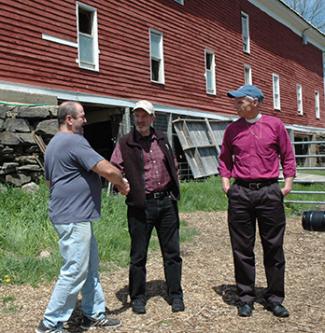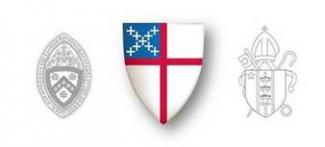At its June 19 hearing, the Massachusetts Legislature's Joint Committee on the Judiciary heard testimony on a range of proposed criminal justice reform measures focused on sentencing and correctional services. The Rt. Rev. Douglas J. Fisher attended the hearing, and the following statement is based on his prepared testimony, adding the support of the bishops of the Episcopal Diocese of Massachusetts, the Rt. Rev. Alan M. Gates and the Rt. Rev. Gayle E. Harris.
Bishops and others from the two Episcopal dioceses in the Commonwealth of Massachusetts recently had the opportunity to visit Dismas House in Worcester and Dismas Family Farm in Oakham. The house and the farm are named for the Good Thief in the Gospel of Luke. Dismas is one of two criminals crucified next to Jesus. He asks Jesus to remember him when he enters paradise. Dismas accepts personal responsibility for the wrongs he has committed, yet believes that God can save anyone. His last breath is a leap of faith.
One of us also recently had the opportunity to meet with inmates and conduct the Rite of Confirmation at the Devens federal correctional facility. The men we met recently at Dismas Farm and Devens are like Dismas. Many speak honestly about the impact of drugs and alcohol on their lives, their failures to “get clean” or “stay sober.” Most importantly, they acknowledge that their actions have had consequences for society and for those who love them. Those at the farm, they spend their days tending a harvest that will feed the local community. They have the chance to do good again, to feel connected to the needs of others. We experienced men who own their failure but who believe their lives are meant for something better. We experienced hope.
The men we met at Dismas were imprisoned for crimes related to drugs and alcohol. Addiction is killing us in the Commonwealth. Instead of sending these people to prison, we need to offer treatment. Some must go to prison for their crimes, but a prison system that reinforces shame, strips away dignity and hope – such a system does not do the good we intend. Prisons are in need of a deep, cleansing ideological shift. We must seek to reconcile the incarcerated person with the community they have damaged. We need to seek restorative justice which emphasizes the role of the whole community in the reintegration of the offender.
Somehow, we’ve made jail an end in itself. Get sent there and that becomes your story. We’ve forgotten that removal from the community is a consequence – not the last chapter in a flawed human being’s story. Restoration to the community must be the end of incarceration whenever possible.
We must also ask the legislature to consider the staggering inequity of incarceration by race. Many of us have been deeply affected by our reading of The New Jim Crow, or viewing of the documentary “13th.” We are striving honestly to examine our own Episcopal Church systems to rid them of the sin of racism; we urge you to do the same as you consider reform of our judicial system. Racial reconciliation is of ultimate concern to us as people of faith. We ask you to be conscious of our nation’s need to own the mass incarceration of young black and brown men.
Our governing bodies have been given power to wield justly and for the good of all people. If we pass the Justice Reinvestment Act, we’ll be able to tell a new story – a story of justice and redemption, a story of second chances and greater safety for our communities. Be assured of our prayers for you and for all leaders in government who strive to respect the dignity of all human beings.
The Rt. Rev. Douglas J. Fisher, Bishop of the Episcopal Diocese of Western Massachusetts
The Rt. Rev. Alan M. Gates, Bishop of the Episcopal Diocese of Massachusetts
The Rt. Rev. Gayle E. Harris, Bishop Suffragan of the Episcopal Diocese of Massachusetts
'Second chances & greater safety': MA bishops call for criminal justice reform
June 20, 2017


